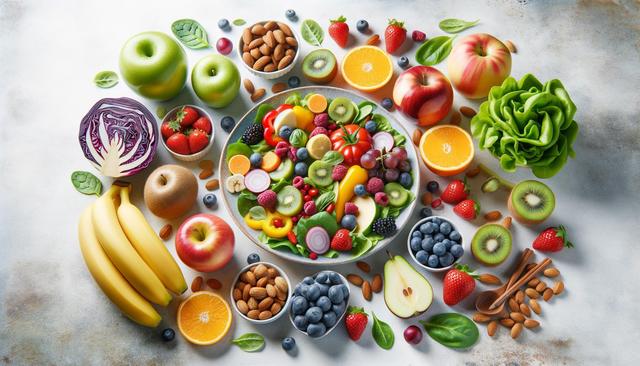Clean Eating Without Dieting: A Balanced Approach to Nourishment
Clean eating focuses on making mindful food choices without the pressure of strict diets.

Understanding Clean Eating
Clean eating is often misunderstood as a restrictive regimen, but in reality, it’s about embracing foods in their most natural, wholesome form. It doesn’t require counting calories or eliminating entire food groups. Instead, it encourages a balanced lifestyle that supports physical and mental well-being. Clean eating emphasizes minimally processed foods, whole grains, fresh fruits and vegetables, lean proteins, and healthy fats. The goal is to nourish the body with ingredients that are as close to their natural state as possible, which can be achieved without engaging in traditional dieting practices.
At its core, clean eating is less about what you remove and more about what you include. This approach shifts the focus from restriction to nourishment. When you prioritize quality over quantity, you develop a more sustainable and enjoyable relationship with food. Labels like “good” or “bad” are avoided, which reduces guilt and encourages mindful choices that can be maintained long-term.
Creating a Clean Eating Routine
Building a clean eating routine starts with small, manageable steps. It’s not about overhauling your diet overnight but making gradual changes that align with your preferences and lifestyle. Start by incorporating more whole foods into your meals. Choose options that are easy to prepare and satisfying. Here are a few steps to begin with:
- Replace refined grains with whole grains such as brown rice or quinoa.
- Choose fresh or frozen vegetables over canned options with added sodium or preservatives.
- Snack on nuts, seeds, or fruit instead of processed chips or sweets.
- Cook at home more often to control ingredients and cooking methods.
Meal planning also plays a key role in supporting clean eating. Preparing meals in advance can help you avoid quick, less nutritious choices. Batch cooking, creating a weekly menu, and keeping healthy staples on hand are practical ways to stay on track without feeling deprived.
Mindful Eating Over Restriction
One of the most important aspects of clean eating without dieting is adopting a mindful approach to food. This means paying attention to your hunger cues, eating slowly, and savoring each bite. Mindful eating helps you build a deeper connection with food and understand how different meals affect your energy, mood, and overall health.
Practicing mindfulness can involve:
- Eating without distractions, such as TV or phones.
- Noticing the flavors, textures, and aromas of your food.
- Recognizing when you’re full and stopping before feeling overly stuffed.
By focusing on how you eat, rather than just what you eat, you can reduce overeating and emotional eating. This shift supports long-term wellness and encourages intuitive choices without the constraints of a diet.
Balancing Indulgences and Everyday Choices
Clean eating doesn’t mean you can never enjoy a treat. In fact, balance is essential to maintaining a healthy lifestyle without falling into the cycle of restriction and overindulgence. Allowing yourself to enjoy occasional indulgences without guilt helps maintain a realistic and sustainable approach to eating.
Instead of labeling foods as “off-limits,” consider how they fit into your overall pattern of eating. A slice of cake at a celebration or a favorite snack during a movie night can be part of a healthy life when balanced with nutrient-rich meals throughout the week. This mindset helps you stay consistent without feeling deprived or pressured to follow rigid rules.
Clean eating is flexible and adaptable. It’s about making thoughtful choices that prioritize your well-being while still allowing room for enjoyment and spontaneity. When you let go of strict rules and embrace balance, eating becomes a source of pleasure and nourishment.
Long-Term Benefits Without Diet Culture
By embracing clean eating without dieting, you’re more likely to develop lifelong habits that support your overall health. Unlike fad diets that often lead to short-term changes, this approach fosters consistency and self-awareness. Over time, clean eating can lead to benefits such as improved digestion, steady energy levels, better sleep, and enhanced mental clarity.
Because clean eating doesn’t involve extreme restrictions, it’s more accessible and sustainable for many people. It encourages listening to your body, trusting your instincts, and choosing foods that make you feel good physically and emotionally. This gentle, mindful approach often leads to:
- Greater confidence in food choices.
- Reduced stress around eating.
- Improved relationship with food and body image.
Most importantly, clean eating without dieting removes the pressure to conform to unrealistic standards. It empowers individuals to focus on nourishment, enjoyment, and balance instead of chasing quick fixes or external validation.
Conclusion: Embracing Simplicity and Sustainability
Clean eating without dieting offers a refreshing alternative to the often overwhelming world of restrictive food plans. It emphasizes quality, mindfulness, and balance, making it suitable for anyone looking to improve their eating habits without stress. By making thoughtful choices, listening to your body, and allowing flexibility, you can create a nourishing lifestyle that supports your health for the long term. Whether you’re just starting out or looking to fine-tune your current habits, clean eating provides a practical, sustainable path toward feeling your best—without the need for dieting rules.